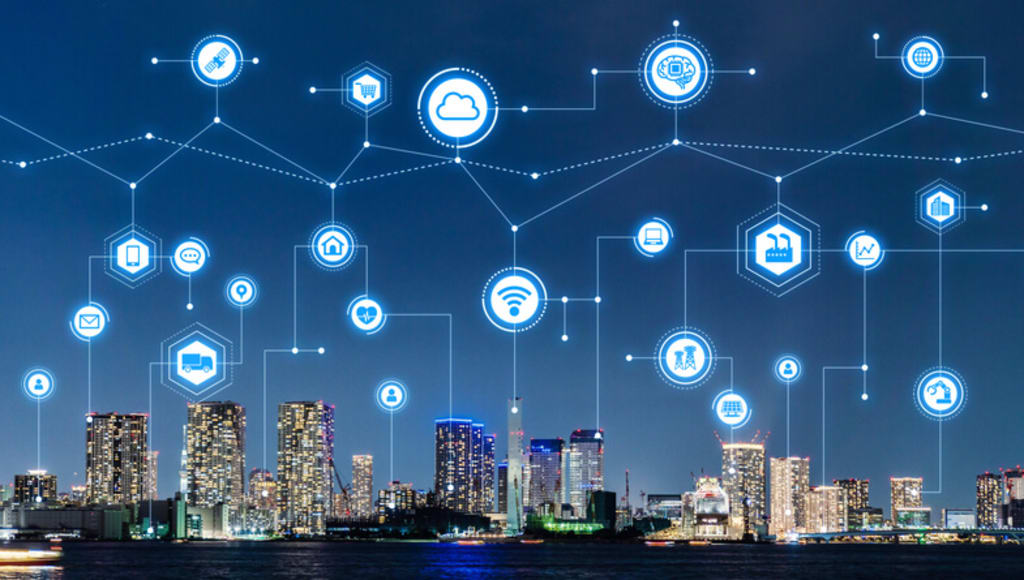Applications and Role of AI in Smart Cities for Sustainable Development
AI in smart cities is going to play big role in making urbanization smarter, aiming to achieve sustainable growth making the cities equipped with advanced features

As per the international organization reports, globally more than fifty percent population is living in urban areas, and by 2050, more than two-third population will live in cities providing big investment opportunities of tech development companies.
As per the International Data Corporation report, by 2021, the spending on smart cities is likely to reach more than $130 billion to make the urban areas and cities more livable with advance infrastructural facilities and society management system.
AI in smart cities is going to play big role in making urbanization smarter, aiming to achieve sustainable growth making the cities equipped with advanced features to live, walk, shop, and enjoy a safe and more convenient life in such environments.
While developing cities to make them smart, several challenges like administration, sanitation, traffic congestion, security surveillance, parking management and many more are overcome by AI as it can help to provide a sustainable solution to habitants.
Application of AI in Smart Cities
The use of artificial intelligence in smart cities can be life changing if implemented in the right spaces. There are multiple zones in cities or in urban development where AI can be used to improve the performance and efficiency of a system.
Advance Security Camera & Surveillance System
AI-enabled cameras and sensors can keep an eye on the surroundings to enhance security level in the city’s neighborhoods. Such cameras can recognize the people, their faces or track unusual activities done by them in restricted areas.
High-resolution AI security camera system can track the movement of all registered vehicles and can monitor crowd density and cleanliness of public spaces round-the-clock. Thanks to the historical data available from different departments of the city, police can predict category and intensity of crimes monitoring all such activities in a particular area.
Vehicle Parking and Traffic Management System
In cities, most of the people have their own cars, also, there is a huge movement of commercial vehicles to transport people as well as goods. So, parking of such vehicles and traffic management is another space where AI can be of great help.
Using the road surface sensors or CCTV cameras incorporated into parking spots allows cities to create real-time parking and traffic maps, helping drivers to save enormous time by avoiding long queues to find an empty spot for parking or to move smoothly in traffic.
AI-supported traffic sensor systems can use cameras to collect real time data of vehicles on road, and send it to a control center, which collates the data fed from other points and adjusts the signal timings to ensure smooth flow of vehicles.
Smart transportation also includes public sector, and thanks to AI, there are lots of opportunities of improvement for public transit. Now even the cab services like Uber are also using AI to give a better riding experience to its customers.
Autonomous Flying Objects for Ariel View Monitoring
AI-enabled drones or autonomous flying and similar objects can be used to monitor the inner-city and houses or other concerning areas. The in-built cameras in drones help to provide the real-time visuals of the different locations, where humans cannot reach easily or quickly helping administration and security departments to take actions in time.
Autonomous flying drones can track humans, monitor traffic movements, and provide the 2D aerial view imagery mapping for better urbanization of cities. It can be used for advanced security and surveillance for security departments and crime squad.
Face Detection Cameras and Movement for Public Safety
AI in face recognition technology is capable of detecting the different people from their faces disclosing their personal identities. AI in security cameras or drones can recognize the human faces and match them with the database to trace his identity and authenticate the person entering in the cities, societies, and other restricted areas.
Landmarking annotation is the technique used to train the AI-based model in face recognition system. To make cities smart, such high-level of face detection technology is necessary to make the surroundings more safe and private.
Smart Waste Management and Disposal System
People living in cities produce huge amount of waste that is another challenge for the urban waste management. To find the right way of managing the generated garbage and keep environment clean and hygienic in the society, is a challenge lots of countries are facing today. AI-enabled cameras can detect trash thrown on the street and recognize the types of garbage for categorization.
Installing AI-enabled sensors on waste bins can make waste collection more efficient. Authorities can receive notifications when the bins are about to be filled and ensure reducing of operational costs by eliminating unnecessary pickups, providing dynamic collection routes, and schedules for optimization of efficient waste management.
Better Governance and Planning Management
While developing the cities or urban townships, AI or machine learning techniques can be used to map land use across time to generate crucial insights using the satellite imagery and aerial view 2D or 3D images of geographical areas.
The algorithms trained through machine learning can analyze satellite images for city planning and development with a huge scope to adjust the formation based on changing data, areas prone to calamities like flooding, earthquakes and storms. Such real-time as well as historical data can continuously be monitored to enable better governance.
Summing-up
AI in smart city development can play a crucial role in urban planning, development and management with advanced security system, traffic monitoring and disposal management to make the societies more secure and livable with access and control of their home and other activities making their living experience more enjoyable and comfortable.
To develop the AI-enabled systems for smart city development, machine learning and AI companies need huge amount of training data for smart cities to train the models like drones, AI security camera and face recognition system to work with accuracy and provide the correct information making the smart cities really smart for sustainable growth.
Cogito can provide such training data sets to train the AI and machine learning system can be used for smart city development. It is involved in data labeling job with expertise in image annotation services to annotate the object of interest in images to make it recognizable to machines through computer vision technology.
Cogito works with advanced data labeling systems complying by all the data security and protection standards to ensure stellar training data sets to produce a highly secured and protected environment helping machine learning developers to build successful and most reliable AI models at low-cost.
This post is originally Published at click here
About the Creator
Matthew McMullen
11+ Years Experience in machine learning and AI for collecting and providing the training data sets required for ML and AI development with quality testing and accuracy. Equipped with additional qualification in machine learning.






Comments
There are no comments for this story
Be the first to respond and start the conversation.